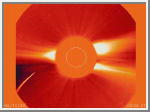|
COMETS EARTH JUPITER KUIPER BELT MARS MERCURY METEORITES NEPTUNE OORT CLOUD PLUTO SATURN SOLAR SYSTEM SPACE SUN URANUS VENUS ORDER PRINTS
PHOTO CATEGORIES SCIENCEVIEWS AMERICAN INDIAN AMPHIBIANS BIRDS BUGS FINE ART FOSSILS THE ISLANDS HISTORICAL PHOTOS MAMMALS OTHER PARKS PLANTS RELIGIOUS REPTILES SCIENCEVIEWS PRINTS
|
Related Documents
Download Options
This movie was assembled from images taken by an instrument aboard the NASA-European Space Agency Solar Heliospheric Observatory (SOHO) and provides a remarkable galactic perspective on the Sun and its place in the Milky Way. North is at the top of the scene, which corresponds with the orientation of the Sun as seen at midday in the northern hemisphere of Earth. Taken during December 22-27, 1996, the series of images show the Sun drifting in front of the stars of the constellation Sagittarius, as the constant solar wind blows outward in all directions. At the time of the observations, SOHO is looking towards the heart of the Milky Way Galaxy. The Milky Way, made by the light of billions of distant stars, forms a luminous band slanting down and to the right. Dark lanes seen in the Milky Way are real features familiar to astronomers. They are created by dust clouds in the disk of the galaxy that obscure the distant stars. A doomed comet, previously unknown, enters on the left of the image on December 22. Its path curves towards the Sun and on December 23 it disappears behind the occulting mask of the coronagraph. It fails to reappear on the far side of the Sun. Whether or not its trajectory took it directly towards the visible surface, the comet must have evaporated in Sun's atmosphere. It was one of a family of comets known as sungrazers, believed to be remnants of a large comet that broke up perhaps 900 years ago. Other fragments were responsible for spectacular comet apparitions in 1843, 1882 and 1965. Finally, in an unrelated event, a plainly visible giant puff of solar gas is emitted, representing a large mass ejection in a direction away from the Earth. This mass ejection causes billions of tons of gas to race out into space on the right-hand (western) side of the Sun. Further information can be obtained from the February 14, 1997 press release. |
